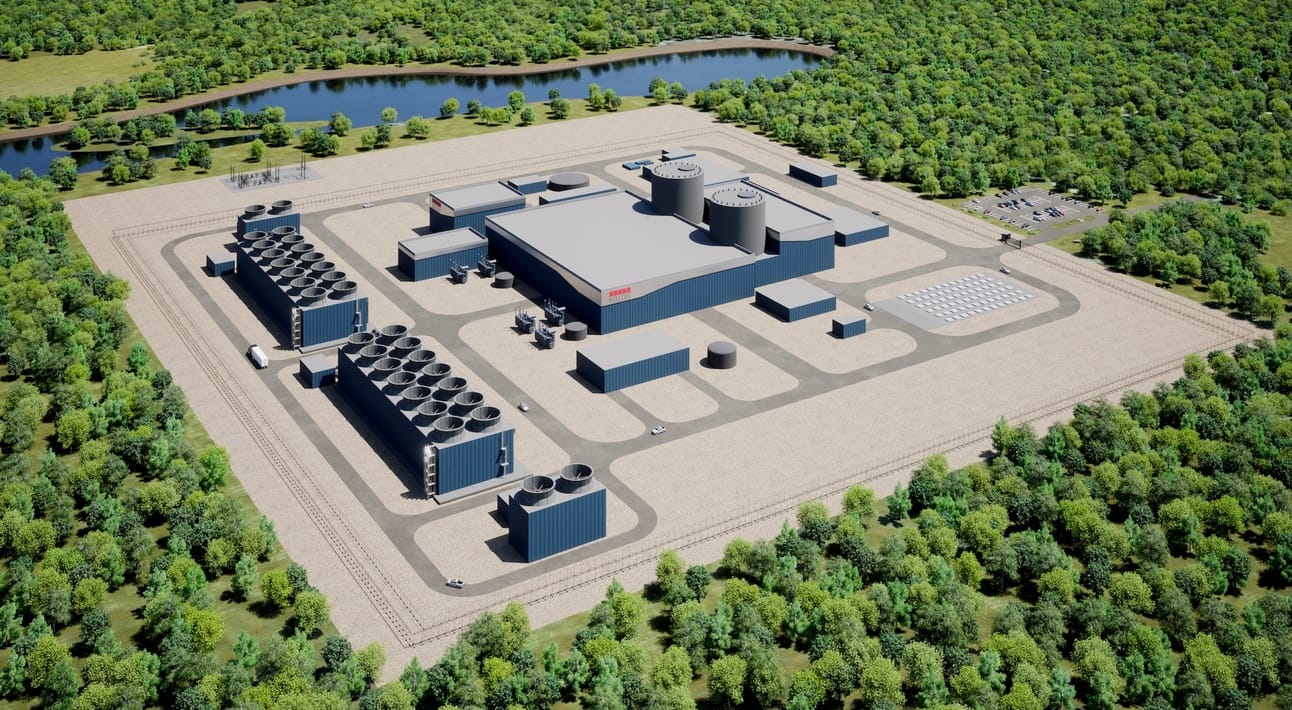Welcome to Grid Brief! Here’s what we’re looking at today: Holtec announces its plans for Palisades nuclear power plant, NERC identifies a 5.2 GW reliability problem, and more.
Holtec’s Plans for Palisades NPP

Holtec’s Dual-Unit SMR-300 Small Modular Nuclear Plant in Perspective View. Source: Holtec International
Holtec International, the company that acquired Michigan’s Palisades nuclear power plant for decommissioning, shocked the industry when it committed itself to refurbishing the plant instead. This week, Holtec has announced more surprises from Palisades: it plans to build two proprietary small modular reactors there.
“The addition of two Holtec small modular reactors (SMRs) near the existing 800-megawatt (MW) plant will nearly double the Michigan site’s total carbon-free generation capacity,” reads the company’s press release.
The twin SMR-300 reactors are built to crank out a minimum of 300 MW a piece, but their thermal output pushes above 1000 MW. Holtec announced its plans after Michigan expanded its commitment to in-state clean energy.
"Today's announcement is an important step for Holtec's SMR-300 design and the future of nuclear in Michigan,” Holtec’s Director of Government Affairs and Communications, Patrick O’Brien, told Grid Brief in a message. “With our efforts to both repower Palisades Nuclear plant and bring an additional 600MW of clean power to the Michigan region this announcement goes a long way to helping meet climate goals."
Holtec looks to begin the construction process in 2026 (after the current reactors at Palisades) with a target commissioning date in the mid-2030s.
The Hidden Reliability Threat

Photo by Zbynek Burival on Unsplash
The North American Electric Reliability Corp. has started tracking instances in which inverter-based resources (IBRs)—like solar—switch off or cut production in response to grid disturbances (e.g. voltage fluctuations). NERC issued recommendations for these power producers, but the organization recently released a report that finds its recommendations aren’t being put into practice.
In March, NERC issued an alert to the solar power producers to submit site-specific information about their disturbance resiliency, but the report says that the producers “did not have the requested facility data readily available,” NERC said.
“About 5,200 MW of bulk electric system (BES) IBRs have voltage and frequency protection settings within the NERC PRC-024 ‘no trip zone,’” reads the report. This means that these solar projects have a higher risk of switching off during a grid disturbance. In other words, solar has reliability issues beyond its usual intermittency.
“For many years, NERC has been working collaboratively with industry to produce worldclass recommended practices to help ensure reliability around this evolving technology,” Ryan Quint, NERC’s director of Engineering and Security Integration said in a statement. “The findings in this report demonstrate that potential reliability gaps exist when those recommended practices are not implemented.”
To remedy this situation, NERC is developing two new reliability standards for IBRs.
Upgrade to Grid Brief Premium to get extra deep dives into energy issues all over the world.
Conversation Starters
The Rockefeller Foundation moves against coal. “The Rockefeller Foundation is backing the world’s first coal-to-clean pilot project in the Philippines that will use carbon credits to enable early decommissioning of a coal-fired power plant,” reports Oilprice.com. “The Coal to Clean Credit Initiative (CCCI), which has support from The Rockefeller Foundation, announced on Monday at the COP28 climate summit a new collaboration with ACEN Corporation to explore a pilot project in the Philippines that would use carbon finance to phase out a coal-fired power plant and replace it with renewable energy.”
Saudi Arabia responds to COP28 fossil fuel phaseout commitments. “Saudi Arabian Energy Minister Prince Abdulaziz bin Salman says the kingdom won’t agree to a text that calls for the phase down of fossil fuels at the COP28 summit in Dubai,” reports Bloomberg. “‘Absolutely not,’ he said when asked in a TV interview in Riyadh whether his country, the world’s top oil exporter, would be happy to see the language added.”
The Environmental Protection Agency announces a crackdown on methane emissions. “More U.S. oil and gas operations will be regulated for methane than ever before under sweeping new federal standards, which for the first time cover petroleum infrastructure built prior to 2015,” reports E&E News. “EPA Administrator Michael Regan announced the new standards on Saturday at the COP28 climate talks in Dubai, United Arab Emirates. The final rule aims to deeply cut methane emissions by requiring equipment upgrades and regular leak inspections. ‘These new standards will help us meet our international commitments to aggressively tackle climate change while improving air quality for communities all across the country,’ said Regan in an event at the U.S. Center in Dubai.”
Crom’s Blessing

Share Grid Brief
We rely on word of mouth to grow. If you're enjoying this, don't forget to forward Grid Brief to your friends and ask them to subscribe!